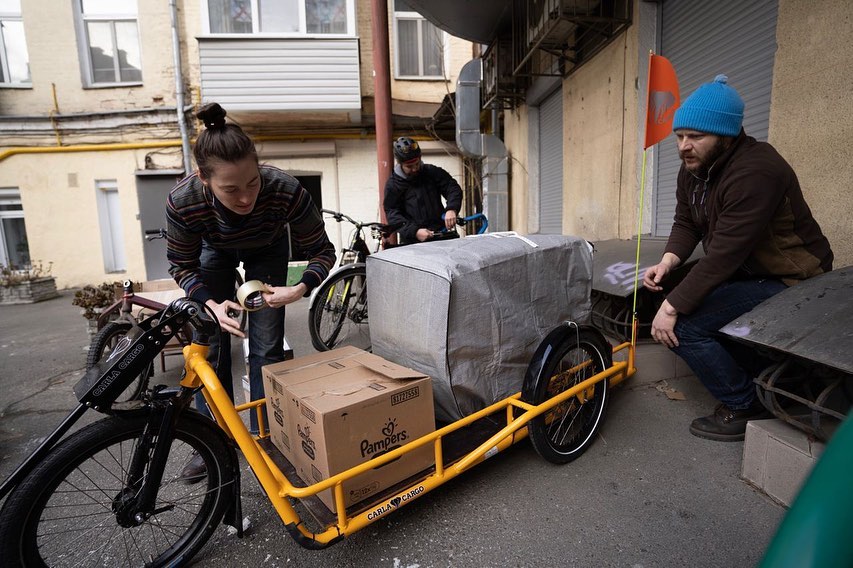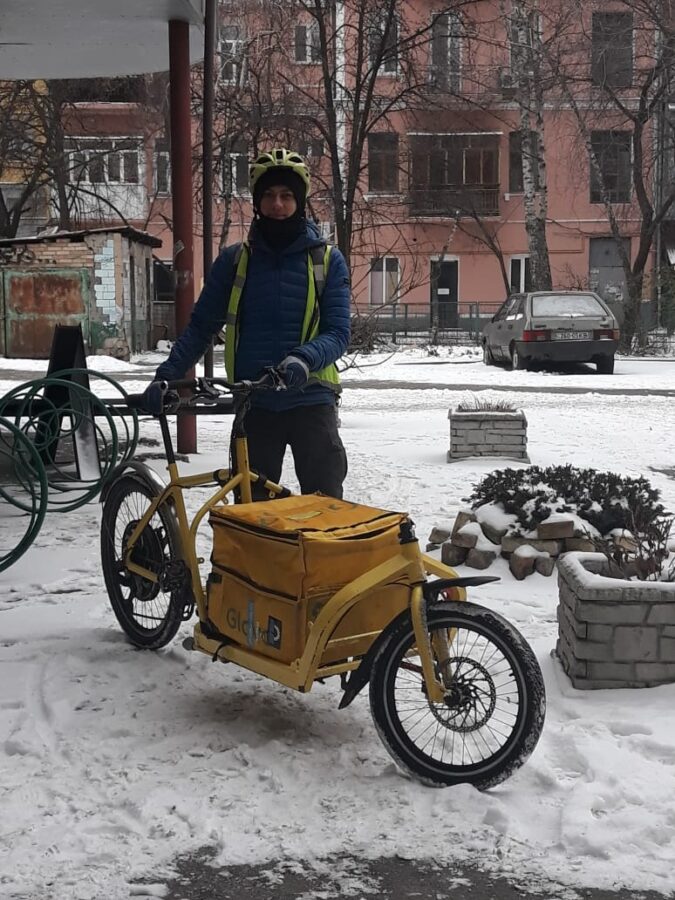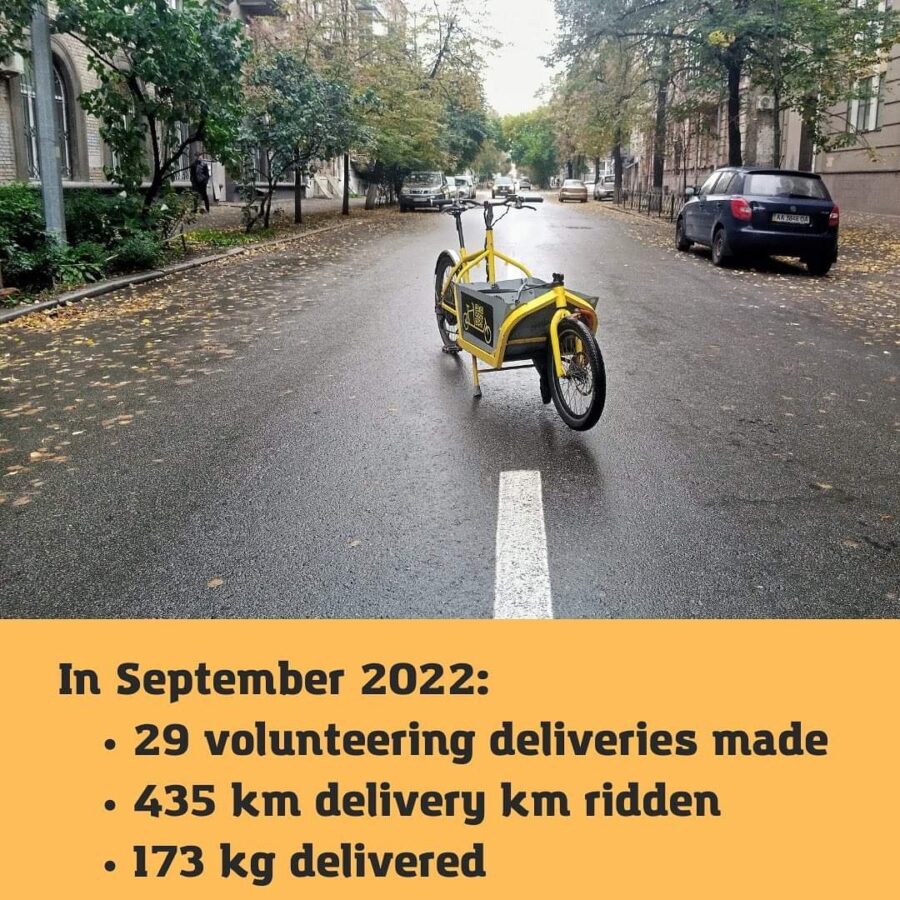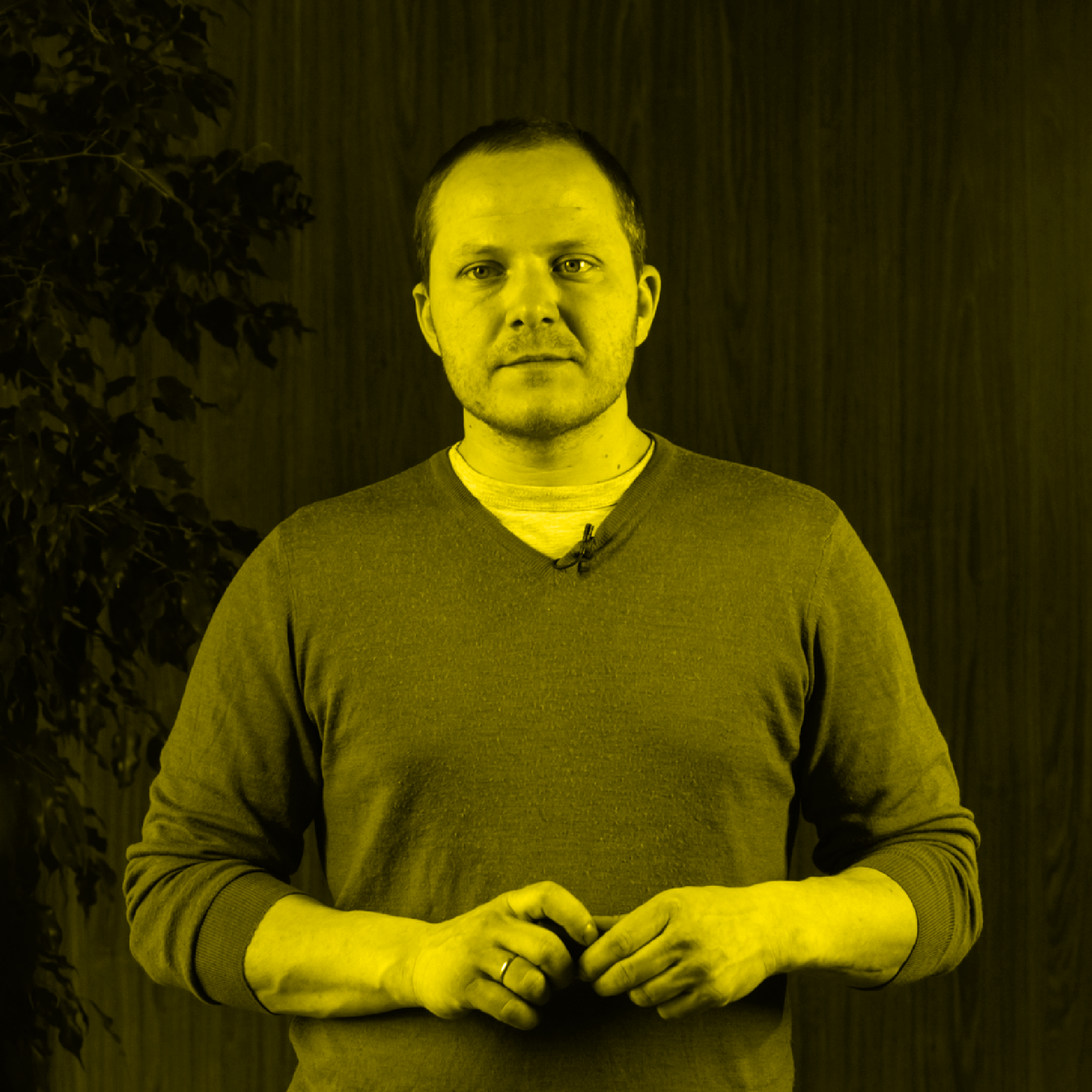8 min. read
Oleksii Khvorostenko is the Bicycle Mayor of Kyiv, Ukraine, and alongside co-founders Yuliya Belinskaya and Karina Agakhanova, runs CargoCult, e-cargo bike delivery service that since the Corona Pandemic, and now in the Russian invasion of Ukraine, supports civilian and state though delivery of essential goods.
—
Please could you tell us about your situation right now?
I’m speaking from my workshop, Lifecycle. It’s a bicycle workshop and cafe, but it’s not operating as usual now because there are no parts. So we’re storing our three cargo bikes here which are used for our other initiative CargoCult, as well as serving as an ideological centre for cycling and logistics, because without us, there would be almost no knowledge of cargo bikes here.

What was your journey to starting CargoCult alongside Yuliya and Karina?
In the beginning, I just wanted to just to be able to ride with my kids, two of them, which makes a normal bike less convenient. I was dreaming about cargo bikes for a long time before I got one, but it wasn’t possible to find one here here due to the expense of importing them. So instead, I found and encouraged someone to build one.
This was the start of CargoCult, before the war, as a commercial enterprise for last mile delivery. The bikes were made here in Ukraine, and are probably still the only few cargo bikes in the country. My role is that of a talking head, but there are a lot of people beside me. Without them, none of this would be possible. I’m just a guy who can fix a bike and talk a little bit about it. Without all these people here in Ukraine, and without your help connecting us to the Bicycle Mayor Network, we wouldn’t have the support we need. It helps to know that the world knows Kyiv and Ukraine exist.
Both now and before the war, you have focused on spreading the message of the potential of cargo bikes as well as implementing day to day logistics.
A consistent focus, throughout all of our activities, is the ability to reach a wider audience and to communicate the difference between the experience we have now in Ukraine, compared to what we could have. First in the pandemic, and now the war, each crisis leads to discovering even greater capabilities of cargo bikes.
The commercial idea started during the pandemic because there was a boom in e-commerce, and delivery services just started skyrocketing in terms of price and demand. This increase spread to a demand for couriers, and then to demand for the bikes themselves. So although the pandemic was bad, the consequences could be used for positive growth. Every crisis in some way presents an opportunity to use bikes. We have seen this in Ukraine more than most places because of the level of crisis here, and it’s clear that this is spreading beyond us, as more and more people are now remembering cycling as a method of transport.
Bikes were also used for people leaving the occupied territories. Bikes move through damaged streets more quickly and easily than a car, and are less likely to be shelled or shot. There are even videos of people moving through the front line on a bike because it’s the safest way. One in particular shows a well known drone pilot peddling on a rusty jiggling bike that was found in a village on the way to the front line. Low-tech transporting high-tech. We have also answered requests from friends who are cyclists and now need a cargo bike to use for military testing.
The perspective of our society currently is a unique one as it rediscovers cycling in this way, when it’s the only viable transport option.

What were some specific challenges and opportunities that the pandemic gave you that you’re now adapting with the war?
We were prepared ahead of time in many ways because we were pioneering the idea of electric cargo bikes before there was demand. The pandemic changed that very quickly, and we reached levels that we had never dreamt of. Big companies contacted with us because they saw our bike in the streets with a sticker showing our phone number and a QR code. They wanted to order hundreds of bikes, but we had no way of supplying that demand at the time, with just one bike on the road and one more in production. It was frustrating, and then even more so when the pandemic ended and the demand then dropped. People went back to using cars, traffic returned to Kyiv. The demand during the pandemic was in part as a public relations need for retailers rather than a real desire for or understanding of the benefits of cargo bikes.
The opportunity remains then in further communicating why a bike is so much more suitable than a car on a commercial scale. It’s faster, it’s cheaper, it’s more much more convenient. We’re still doing this just by operating day-to-day in the city. When other delivery companies see us they’re frustrated that we’re earning the same amount as them, but without the struggles they face with fuel, repairs and traffic. Really they need to see us not as cheaters, but as a template to copy. They need to join us if they want to deliver the same results.
In Ukraine fuel shortage and infrastructure breakdown has been brought about by war, but in the future, many cities around the world are likely to face the same problems due to the climate crisis. What could Kyiv teach those cities?
The world can definitely learn from us. We face such huge difficulties, and are constantly having to find our own ways to solve them. In a way we’re pioneers in this situation and the way we handle things, but we’re not alone. During one of the Bicycle Mayor Network regional calls the Bicycle Mayor of Tripoli, Natheer Halawani, said that in his work, he’s not spending time arguing with the government over policy. It’s not that their government is doing anything good, but the fact that they don’t have a government at all. There is no power that needs to be addressed, they just have to make the change themselves. It’s the same for us, during crisis citizen-based movements are crucial for survival.
He also said that before the crisis in Lebanon, nobody was riding bicycles because they were seen as cheap. When the crisis came, the people who already had bikes realised their value. They’re much more mobile and can be adapted for different needs. Even a regular bike can be used by an elderly person without riding it, just as a method of holding their belongings while being pushed along.
Really it comes down to the basics of utility. A bicycle makes it possible to move a load a longer distance with less energy. You can’t question efficiency in a crisis; that’s when the perception of cycling as a recreational activity will fall away.
I was speaking with someone based in the UK recently and they said to me that we must “win the war, in order to save us.” They were acknowledging us, and the people of Ukraine, as a student would. They were emphasising that the war is not a Ukrainian problem. It’s a problem for the world.
The problems we have been forced to solve are different to those in much of the rest of the world now. With few resources, when you’re faced by the question of how much armour or water you can take to the front line, you start to see the cargo bike differently than you might in London. But we are all going to have to change our habits at some point, and these crises are catalysts for that.

Is there any last message you would want to share?
First of all, use your bike. Turn your pedals.
Then be honest. First of all to to yourself, about what you do and what your goals are.
And then try to think ahead, because thinking at least one step ahead will give you a big advantage. I hope that Ukraine will serve as an example for the world, of how to see and deal with problems before it’s too late.
All Images: CargoCult

